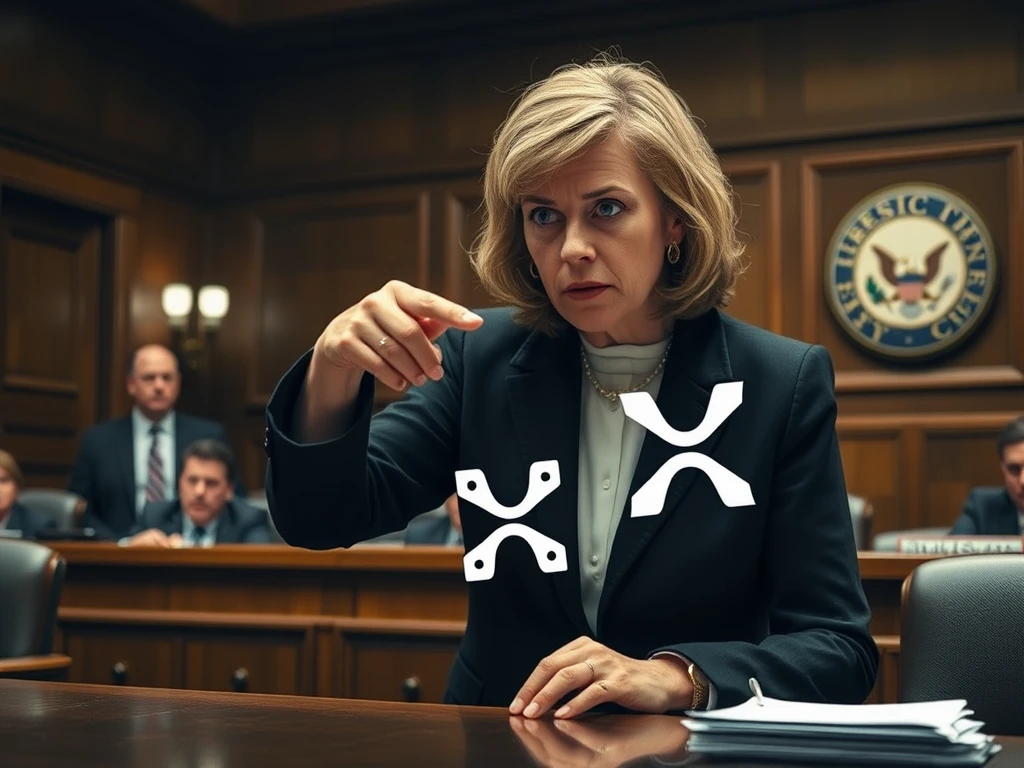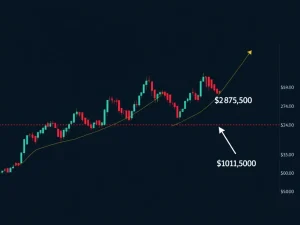SEC Ripple Settlement: Crenshaw Issues Dire Warning on Regulatory Vacuum

The ongoing legal battle between the US Securities and Exchange Commission (SEC) and Ripple Labs has taken another turn, with a proposed SEC Ripple settlement facing sharp criticism from within the agency itself. SEC Commissioner Caroline Crenshaw has voiced strong opposition to the potential deal, raising concerns about its impact on investor protection and the regulator’s credibility.
Caroline Crenshaw Slams Proposed Deal
SEC Commissioner Caroline Crenshaw did not mince words in her May 8 statement regarding the proposed settlement with Ripple. She argued that the agreement, if approved, would join a series of recent dismissals that are damaging the standing of SEC lawyers in court.
According to Crenshaw, these dismissals force SEC attorneys to adopt legal positions that contradict previous stances taken just months prior. This inconsistency, she believes, erodes the credibility needed to effectively regulate the market and protect the public.
Warning of a Regulatory Vacuum
A central concern raised by Crenshaw is the potential creation of a “Regulatory Vacuum.” She contends that the settlement, coupled with what she describes as the “programmatic disassembly” of the SEC’s crypto enforcement program, does a significant disservice to investors.
Crenshaw argues that the proposed deal would effectively erase investor protections previously established through court rulings. Until a new regulatory framework is established, this could leave a gap in oversight, creating uncertainty and potential risks for those investing in the crypto space. She stated the settlement “creates more questions than answers” and is not in the best interest of the public or markets.
What the SEC Ripple Settlement Entails
The proposed settlement involves a joint letter filed by the SEC and Ripple in a New York court. The key terms include:
- Dissolving the August 2024 injunction against Ripple.
- Returning $75 million out of the $125 million in civil penalties currently held in escrow to Ripple.
This proposal follows a ruling in August of the previous year in the XRP Lawsuit, where a judge determined that Ripple’s XRP token constituted a security when sold to institutional investors and ordered the company to pay $125 million in penalties.
The Path Forward for the XRP Lawsuit
Despite the proposed agreement, the XRP Lawsuit is not yet concluded. According to former federal prosecutor James Filan, several steps remain before the case can be finalized. These include:
- Judge Torres must issue an indicative ruling indicating her agreement to the settlement letter.
- If approved, the parties would request a limited remand from the Second Circuit Court of Appeals back to Judge Torres.
- A motion for the agreed settlement would then be filed with Judge Torres.
Only after the injunction is dissolved and funds are distributed will the SEC and Ripple ask the Court of Appeals to dismiss their respective appeals, bringing the long-running case to a close.
Implications for SEC Enforcement
Commissioner Crenshaw’s comments highlight differing views within the agency regarding crypto regulation and SEC Enforcement strategy. She suggests a shift away from the more aggressive stance seen under former SEC Chair Gary Gensler. This trend of dismissing enforcement actions against crypto firms is, in Crenshaw’s view, detrimental.
The outcome of Judge Torres’ decision on the proposed SEC Ripple settlement will be closely watched, as it could have broader implications for how the SEC approaches future cases involving digital assets and the application of securities laws in the crypto market.
Summary
SEC Commissioner Caroline Crenshaw has strongly criticized the proposed settlement between the SEC and Ripple, arguing it undermines the agency’s credibility, erodes investor protections, and creates a regulatory vacuum. The settlement, which involves dissolving an injunction and returning a portion of penalties from the XRP lawsuit, still requires judicial approval and involves further legal steps. Crenshaw’s dissent underscores ongoing internal debate and potential shifts in SEC enforcement approaches towards the crypto industry.






